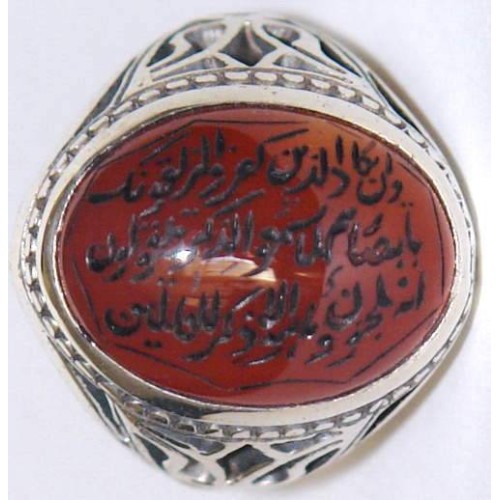- On sale!






Weight: 15.9 grammes
Wa In Yakād Verse (Arabic: آیة وإن یکاد) refers to verses 51 and 52 of Sura al-Qalam. It is also known as the Verse of Evil Eye. Many people install a board containing this verse in their work places, houses, or other places to make themselves immune to evil eyes. The verse implies that unbelievers sought to hurt the Prophet (s) with their evil eyes after hearing the Qur'an.
وَمَا هُوَ إِلَّا ذِكْرٌ لِّلْعَالَمِينَ
Meaning:
And lo! those who disbelieve would fain disconcert thee with their eyes when they hear the Reminder, and they say: Lo! he is indeed mad; When it is naught else than a Reminder to creation.
Content of the Verse
The word, "in" (إن) with no stress on "n" (ن) is a short form of "inna" (إنّ), which is a preposition for emphasis. "Yazliqunak" (یزلقونك) is from the Arabic root, "z-l-q" (ز-ل-ق) which means slipping or tripping. "izlaq" (أزلاق)—literally, to make someone slip or trip—is a metaphor for striking or killing someone.
The meaning of the verse is as follows: "the Unbelievers would almost trip you up with their eyes when they heard the reminder [i.e. the Qur'an]", that is, they would kill the Prophet (s) with their evil eyes. According to some exegetes of the Qur'an, the verse means that when they hear the Qur'an from the Prophet (s), they look at him with an eye full of hostility and anger, such that they want to kill him with their eyes.
Some unbelievers accused the Prophet (s) of being insane, saying that the Qur'an was suggested to him by evils and jins. In response, the Qur'an said that the Qur'an "is nothing less than a reminder to all the worlds".
About the occasion of the revelation of this verse, it is said to be concerned with evil eyes on the Prophet (s) by some of his enemies. According to some books of hadiths and supplications, it is useful to recite and write this verse to prevent evil eyes of jealous people. For example, there is a hadith transmitted by Hasan al-Basri according to which "the solution for evil eyes is to recite the verse, "wa in yakad alladhina kafaru…".
Many people install this verse as written on a board in their work place, houses, or other places to prevent evil eyes.
This verse is one of the most commonly used Quranic verses in ordinary lives of Iranian people. Many people in Iran use it as a protection against evil eyes.
This verse is written completely and installed on house entrances to protect evil eyes. The use of this verse as a decorative board on the entrances of houses is very common. According to some statistics, this is the most commonly used verse on the doors of houses in Iran.
Murtada Mutahhari has criticized the folk conception of this verse among Iranian people and its wide use by them. He believes that the wide use of this verse on entrances of houses and buildings is evidence of people's pessimism towards each other.
You might also like